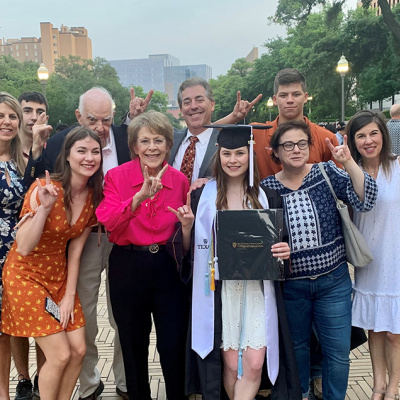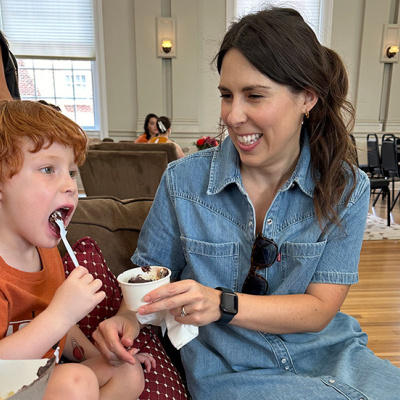Four Under 40: 2012's Outstanding Young Texas Exes
How do you measure success? Some people look to bank account ledgers; others hope to carry on a legacy through their children. This year’s Outstanding Young Texas Exes are leaders in fields ranging from diversity research to Olympic diving—but all four share a common drive to define success in their own ways. They include an attorney whose passion for mentoring made him National Big Brother of the Year and a Middle East expert whose learning disability only served to spur him forward. Get ready to be inspired.

Laura Wilkinson
BS '01
When Laura Wilkinson learned she had been named an Outstanding Young Texas Ex, she was stunned.
“I was pretty surprised,” she says. “I feel like I haven’t done anything; other recipients of this award are out changing the world. It’s very humbling.”
So says the first woman in history to win a gold medal in every major platform diving competition—the 2000 Olympic Games, 2004 World Cup, and 2005 World Championships.
Laura, who grew up in the Texas town of Spring, started diving at the age of 15, though she was told she was too old for the sport. Nine months later, she was kicked off her diving team for being “a waste of space.”
“It was unfortunate, but it became my fuel,” Laura says. “That really lit a fire under me, and encouraged me to prove everyone wrong.”
And she did. The next year, she hit the trifecta, earning her first national title, landing a spot on the U.S.A. National Team, and winning the bronze at the World Cup.
After competing for three years at UT and working toward a degree in public relations, it seemed her life was falling into place as she prepped for the 2000 Olympic Trials. But then Laura shattered her foot while warming up on a mat. Between healing and recovery time, she had only three weeks of physical training prior to the trials.
Despite having to hobble up to the platform, she decided to compete anyway—and ended up walking away with an Olympic gold medal.
“That’s one of my proudest accomplishments,” Laura says, “getting up there with a broken foot and making the Olympic team. Diving helped me learn a lot about myself—that I can definitely roll with the punches.”
Today, the Texas Hall of Famer lives in The Woodlands with husband Eriek Hulseman and daughter Arella. Her passion for seeing young athletes achieve their dreams led her to create the Laura Wilkinson Foundation, an all-volunteer nonprofit that raises funds for new facilities for young divers.
“Diving is about passion,” Laura says. “Every once in a while, that passion truly pays off.” —Jordan Schraeder

Ben De Leon
BA '01, BS '01, JD '04, Life Member
You'd swear that success as an orangeblood was a given for Ben De Leon, BA ’01, BS ’01, JD ’04, Life Member. He was raised in Austin, where his father, Hector, BS ’70, JD ’73, Life Member, Distinguished Alumnus, has long been a successful attorney.
But Ben forged his own path—and it almost didn’t include UT. He was “seconds away” from attending Notre Dame, having signed the paper- work. But the next morning, something didn’t feel right. He chose UT. “It was the best decision I could’ve made,” he says.
In high school, Ben played on the Westlake Chapparals’ 1996 state championship football team. His teammates even voted him Outstanding Defensive Lineman of the Year (classmate and now-NFL star Drew Brees was voted MVP that same year).
Underneath the achievements, though, Ben’s confidence was low. He couldn’t believe his teammates had truly voted him outstanding. “It seemed like a joke,” he says. Later, as he continued to law school, doubt about whether he really belonged among his many brilliant classmates dogged him, too.
But Ben fought through it, passed the bar exam, got married a month later, and established himself as a successful lawyer and community servant. He joined his father’s law firm of De Leon & Washburn P.C. as a clerk in 2004—something he’d never expected—and in July will become its president.
The honors Ben has won outside standard legal work are invariably for service. Among them: the Judge Suzanne Covington Pro Bono Award from Volunteer Legal Services of Central Texas, given for taking on so many cases at no charge. He keeps at least one such case—typically family law cases representing a Spanish-speaking woman trying to better her situation—always on his docket.
And then there’s the biggest award yet: 2009’s National Big Brother of the Year for Big Brothers Big Sisters. Ben has been in his “little brother” Anthony’s life since the Austin boy, now 13, was in second grade. The two got to go twice to the White House to meet the president.
At 33, Ben leads a hectic life. He chairs the Texas Exes Scholarship Committee, and he and his wife, Shannon, have three children: 4-year-old Anna, 2-year-old Winslow, and newborn Henry. But no matter how busy he gets, Ben vows to make time for pro bono work, promoting education, and mentoring others like Anthony. As he says: “I just really feel a calling to help.” —Lynn Freehill

Rich Reddick
BA '96, Life Member
At 21, Rich Reddick started winning huge cash payouts totaling $125,000. Using his wins, Reddick put a down payment on a house, bought an Acura Integra, and paid off his college debts from hitting up Whataburger so often.
No lottery, no casino. Reddick, BA ’95, Life Member, won the money on game shows Jeopardy, Wheel of Fortune, Win Ben Stein’s Money, and Who Wants to be a Millionaire. It took brains, personality, and a pinch of good fortune—a combination Reddick has managed throughout his career since.
An Air Force brat, Reddick grew up mostly in England, landing in Austin in ninth grade. He wasn’t considering UT, but as luck would have it, his principal pulled him out of class to meet with a Texas recruiter. He won a Texas Achievement Honor Award—a full-ride scholarship that would allow him to live on campus, too. His mom cried.
Once on the Forty Acres, Reddick was mentored by campus icons like Sharon Justice, Brenda Burt, and Ricardo Romo. Both intelligent and charismatic, he became a Plan II major, an orientation advisor, a Leadership Board member, and a Silver Spur. “The co-curriculars drew me into the University community,” he says. “That was the game changer for me.”
But in the early ’90s, the climate could be chilly for black students, Reddick says. No one openly told him he was unwelcome, but he faced daily slights he now calls “micro-aggressions”—suspicious questions about his SAT score, for instance, that implied he didn’t belong. “Well, that’s interesting,” a questioner might say. “My friend got a higher score and didn’t get in.”
Fascinated by diversity issues in education, Reddick did a stint with Teach for America, then went on to Harvard for a PhD. Now he’s back on campus as an assistant professor in UT’s Col- lege of Education. There he researches the work experiences for different types of faculty, from African Americans to dads of small children (he and his wife, Sherry, have 2-year-old Katherine and 4-year-old Karl).
Asking hard questions about people from varied backgrounds gives Reddick great satisfaction. “One of my mentors at Harvard said this the best: the only place we get to openly deal with issues of diversity is higher ed,” he says. “It sounds hokey, but when I walk the campus, I think this is the best job in the world.”
And how about that game-show side gig? In most ways the 40-year-old’s career is just heating up, but the big trivia wins are behind him—at least for now. “I’m retired at the present time,” he jokes. “We’ll see if anything comes up. —Lynn Freehill

Lee Bagan
BA '05, MA '07
Lee Bagan
BA ’05, MA ’07
Lee Bagan couldn't read until fourth grade. Words on a page passed through his mind like water through a sieve. Then he was diagnosed with a learning disability called visual process- ing disorder. With help, Bagan quickly learned to love reading. “It was like a light bulb came on, and I couldn’t stop reading,” he says. “All I wanted to do was learn.”
Bagan, BA ’05, MA ’07, has been making up for lost time ever since: graduating in three years as the top student in UT’s Middle Eastern Studies program, then earning a master’s in the same subject. Helping start an endowment for UT students with disabilities. Working for the U.S. Department of Defense in Iraq, advising Navy SEALS on the politics, culture, and history of the regions where they serve. Mastering Arabic, Tajik, and Farsi.
Bagan finds joy in learning about distant cultures. “And that includes Texas,” he laughs. The Illinois native chose UT for its top-ranked Mid- dle Eastern Studies program. When his parents visited Austin, they loved Salt Lick barbecue so much that they made Bagan lug brisket home on the plane over winter break.
At UT, Bagan found support in the Office of Services for Students with Disabilities. His dis- ability meant that it took him much longer to read a book than his peers, and SSD helped him get accommodations. “I know for a fact I would have failed without staff and faculty who cared so much about me,” he says. Instead, he thrived.
When he learned that some UT students can’t afford disability testing—and thus go undiag- nosed—he decided to do something about it. He sat on the Drag with a cup, collecting donations, and before long he and fellow volunteers had raised tens of thousands. Today, the endowment is worth $50,000 and growing.
He was briefing a SEAL team on Middle East- ern politics when Texas Exes CEO Leslie Cedar called to tell him he’d won the award. “I was blown away by the news,” he says. “I am where I am in my life because of UT.” —Rose Cahalan






